Conveyancing: Ensuring Legal Property Transfer and Avoiding Pitfalls
VerifiedAdded on 2023/06/03
|5
|1060
|295
Essay
AI Summary
This essay provides an overview of conveyancing, the legal process of transferring property ownership, including land, houses, and commercial properties. It highlights the two main stages: contract exchange and settlement. The essay details the various searches involved in conveyancing, such as local authority searches, title register checks, flood risk assessments, and environmental searches, emphasizing their importance in uncovering potential issues. It also discusses the role of a conveyancer in ensuring a smooth transaction and avoiding legal pitfalls, mentioning recent cases where conveyancers faced fines for negligence. Common mistakes made by conveyancers, as identified by the Legal Ombudsman, are outlined. The essay concludes by stressing the importance of thorough property searches and choosing a reputable conveyancer to protect buyers' and sellers' interests in property transactions. Desklib provides access to similar solved assignments for students.
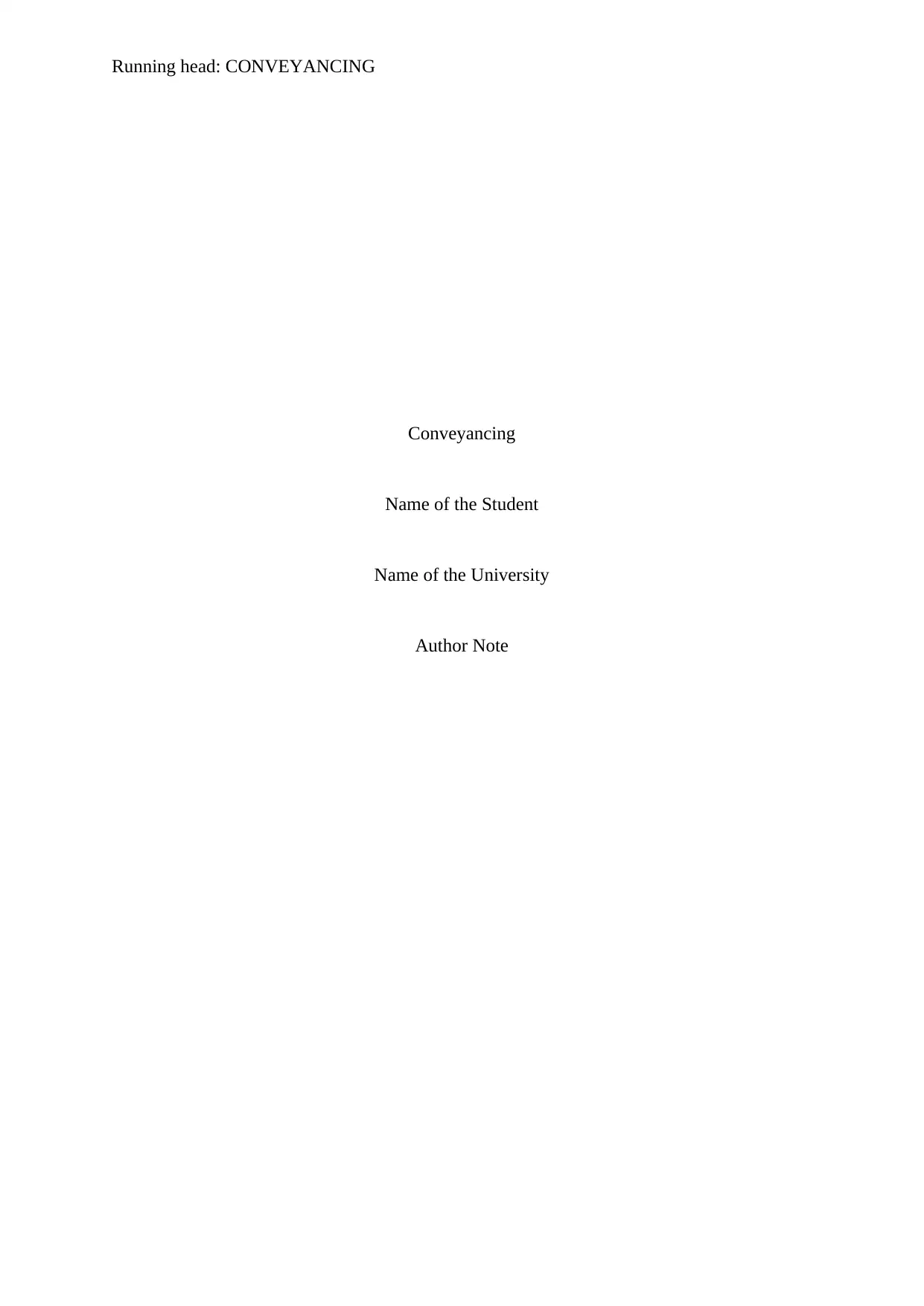
Running head: CONVEYANCING
Conveyancing
Name of the Student
Name of the University
Author Note
Conveyancing
Name of the Student
Name of the University
Author Note
Paraphrase This Document
Need a fresh take? Get an instant paraphrase of this document with our AI Paraphraser
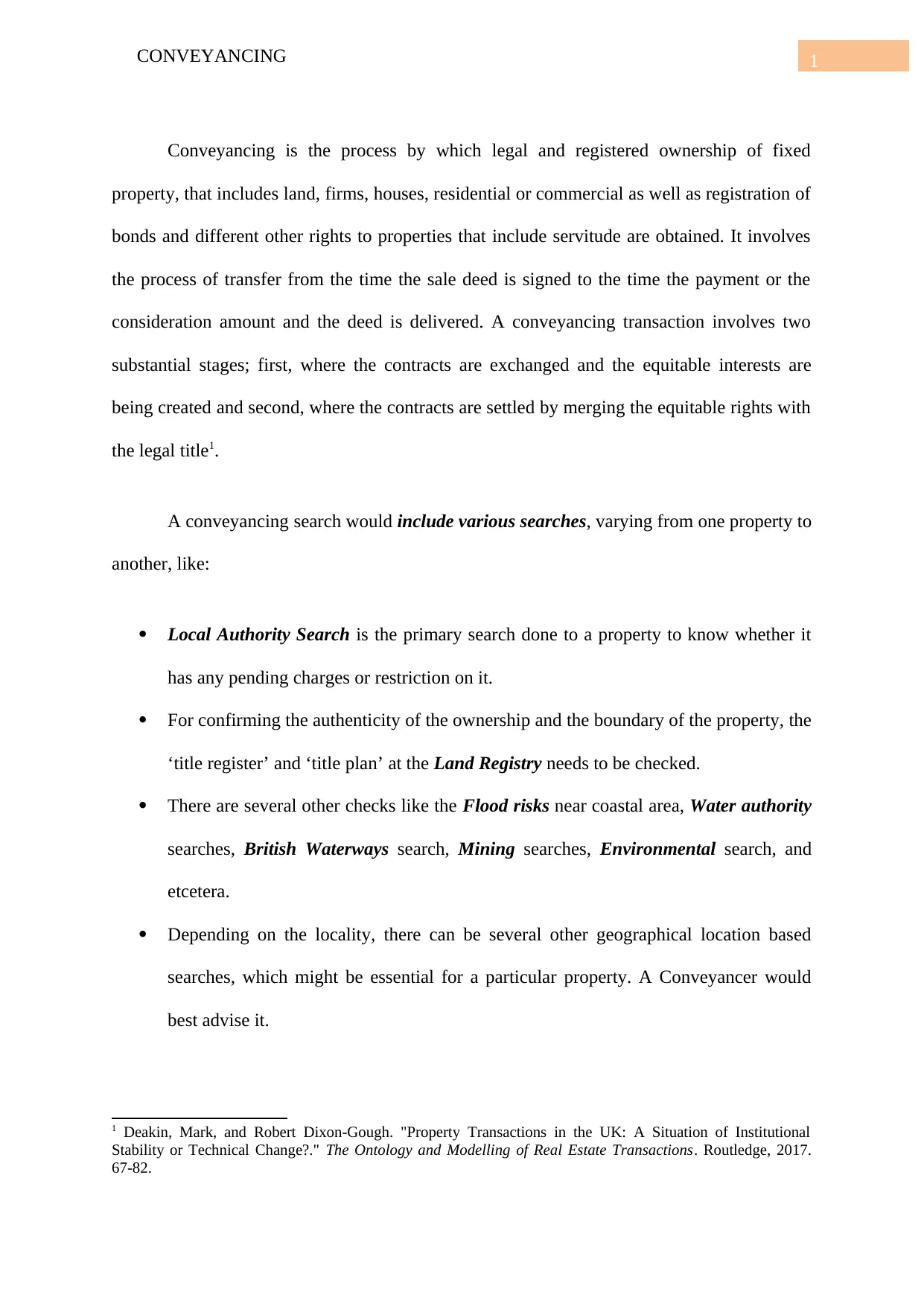
1CONVEYANCING
Conveyancing is the process by which legal and registered ownership of fixed
property, that includes land, firms, houses, residential or commercial as well as registration of
bonds and different other rights to properties that include servitude are obtained. It involves
the process of transfer from the time the sale deed is signed to the time the payment or the
consideration amount and the deed is delivered. A conveyancing transaction involves two
substantial stages; first, where the contracts are exchanged and the equitable interests are
being created and second, where the contracts are settled by merging the equitable rights with
the legal title1.
A conveyancing search would include various searches, varying from one property to
another, like:
Local Authority Search is the primary search done to a property to know whether it
has any pending charges or restriction on it.
For confirming the authenticity of the ownership and the boundary of the property, the
‘title register’ and ‘title plan’ at the Land Registry needs to be checked.
There are several other checks like the Flood risks near coastal area, Water authority
searches, British Waterways search, Mining searches, Environmental search, and
etcetera.
Depending on the locality, there can be several other geographical location based
searches, which might be essential for a particular property. A Conveyancer would
best advise it.
1 Deakin, Mark, and Robert Dixon-Gough. "Property Transactions in the UK: A Situation of Institutional
Stability or Technical Change?." The Ontology and Modelling of Real Estate Transactions. Routledge, 2017.
67-82.
Conveyancing is the process by which legal and registered ownership of fixed
property, that includes land, firms, houses, residential or commercial as well as registration of
bonds and different other rights to properties that include servitude are obtained. It involves
the process of transfer from the time the sale deed is signed to the time the payment or the
consideration amount and the deed is delivered. A conveyancing transaction involves two
substantial stages; first, where the contracts are exchanged and the equitable interests are
being created and second, where the contracts are settled by merging the equitable rights with
the legal title1.
A conveyancing search would include various searches, varying from one property to
another, like:
Local Authority Search is the primary search done to a property to know whether it
has any pending charges or restriction on it.
For confirming the authenticity of the ownership and the boundary of the property, the
‘title register’ and ‘title plan’ at the Land Registry needs to be checked.
There are several other checks like the Flood risks near coastal area, Water authority
searches, British Waterways search, Mining searches, Environmental search, and
etcetera.
Depending on the locality, there can be several other geographical location based
searches, which might be essential for a particular property. A Conveyancer would
best advise it.
1 Deakin, Mark, and Robert Dixon-Gough. "Property Transactions in the UK: A Situation of Institutional
Stability or Technical Change?." The Ontology and Modelling of Real Estate Transactions. Routledge, 2017.
67-82.
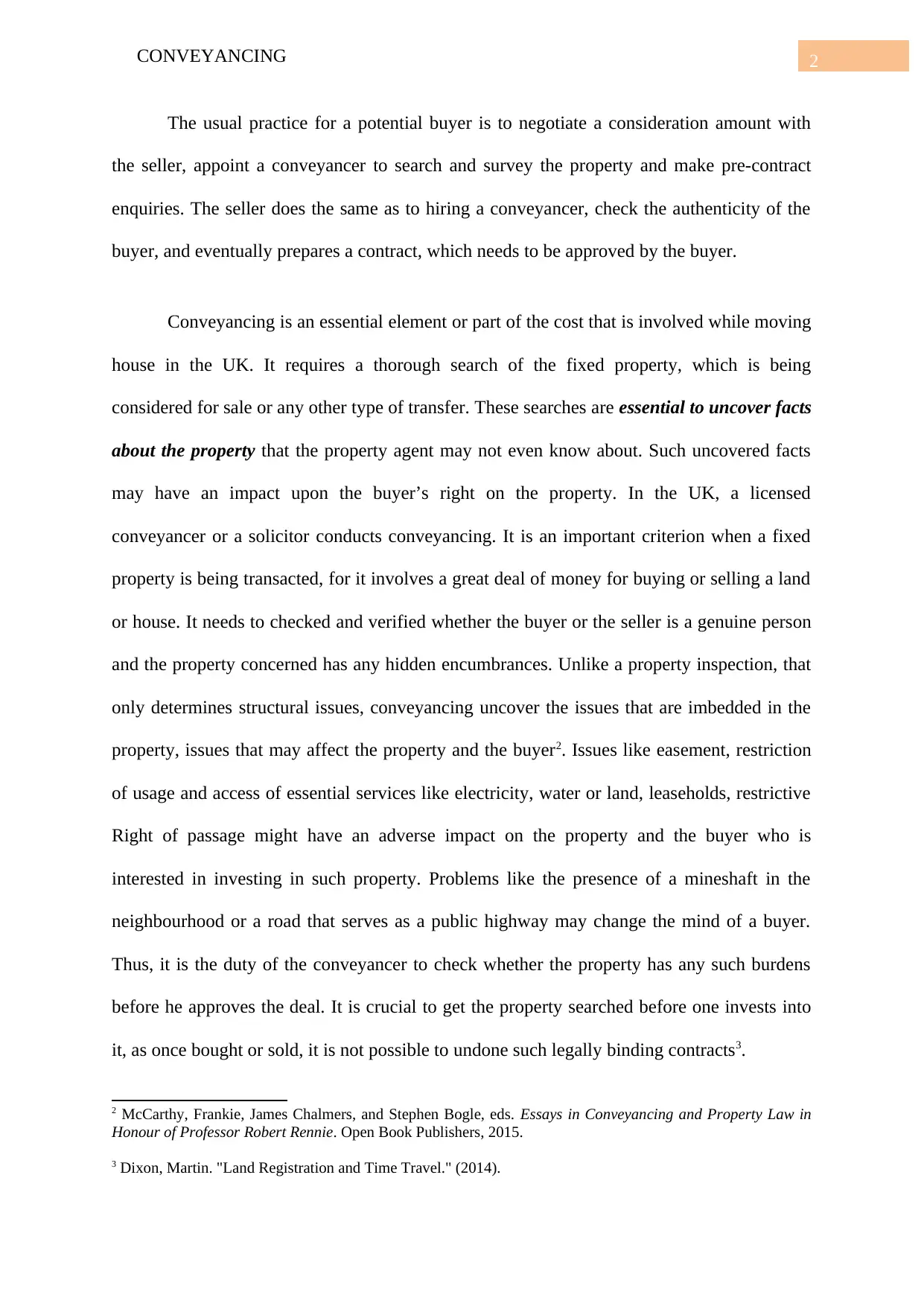
2CONVEYANCING
The usual practice for a potential buyer is to negotiate a consideration amount with
the seller, appoint a conveyancer to search and survey the property and make pre-contract
enquiries. The seller does the same as to hiring a conveyancer, check the authenticity of the
buyer, and eventually prepares a contract, which needs to be approved by the buyer.
Conveyancing is an essential element or part of the cost that is involved while moving
house in the UK. It requires a thorough search of the fixed property, which is being
considered for sale or any other type of transfer. These searches are essential to uncover facts
about the property that the property agent may not even know about. Such uncovered facts
may have an impact upon the buyer’s right on the property. In the UK, a licensed
conveyancer or a solicitor conducts conveyancing. It is an important criterion when a fixed
property is being transacted, for it involves a great deal of money for buying or selling a land
or house. It needs to checked and verified whether the buyer or the seller is a genuine person
and the property concerned has any hidden encumbrances. Unlike a property inspection, that
only determines structural issues, conveyancing uncover the issues that are imbedded in the
property, issues that may affect the property and the buyer2. Issues like easement, restriction
of usage and access of essential services like electricity, water or land, leaseholds, restrictive
Right of passage might have an adverse impact on the property and the buyer who is
interested in investing in such property. Problems like the presence of a mineshaft in the
neighbourhood or a road that serves as a public highway may change the mind of a buyer.
Thus, it is the duty of the conveyancer to check whether the property has any such burdens
before he approves the deal. It is crucial to get the property searched before one invests into
it, as once bought or sold, it is not possible to undone such legally binding contracts3.
2 McCarthy, Frankie, James Chalmers, and Stephen Bogle, eds. Essays in Conveyancing and Property Law in
Honour of Professor Robert Rennie. Open Book Publishers, 2015.
3 Dixon, Martin. "Land Registration and Time Travel." (2014).
The usual practice for a potential buyer is to negotiate a consideration amount with
the seller, appoint a conveyancer to search and survey the property and make pre-contract
enquiries. The seller does the same as to hiring a conveyancer, check the authenticity of the
buyer, and eventually prepares a contract, which needs to be approved by the buyer.
Conveyancing is an essential element or part of the cost that is involved while moving
house in the UK. It requires a thorough search of the fixed property, which is being
considered for sale or any other type of transfer. These searches are essential to uncover facts
about the property that the property agent may not even know about. Such uncovered facts
may have an impact upon the buyer’s right on the property. In the UK, a licensed
conveyancer or a solicitor conducts conveyancing. It is an important criterion when a fixed
property is being transacted, for it involves a great deal of money for buying or selling a land
or house. It needs to checked and verified whether the buyer or the seller is a genuine person
and the property concerned has any hidden encumbrances. Unlike a property inspection, that
only determines structural issues, conveyancing uncover the issues that are imbedded in the
property, issues that may affect the property and the buyer2. Issues like easement, restriction
of usage and access of essential services like electricity, water or land, leaseholds, restrictive
Right of passage might have an adverse impact on the property and the buyer who is
interested in investing in such property. Problems like the presence of a mineshaft in the
neighbourhood or a road that serves as a public highway may change the mind of a buyer.
Thus, it is the duty of the conveyancer to check whether the property has any such burdens
before he approves the deal. It is crucial to get the property searched before one invests into
it, as once bought or sold, it is not possible to undone such legally binding contracts3.
2 McCarthy, Frankie, James Chalmers, and Stephen Bogle, eds. Essays in Conveyancing and Property Law in
Honour of Professor Robert Rennie. Open Book Publishers, 2015.
3 Dixon, Martin. "Land Registration and Time Travel." (2014).
⊘ This is a preview!⊘
Do you want full access?
Subscribe today to unlock all pages.

Trusted by 1+ million students worldwide
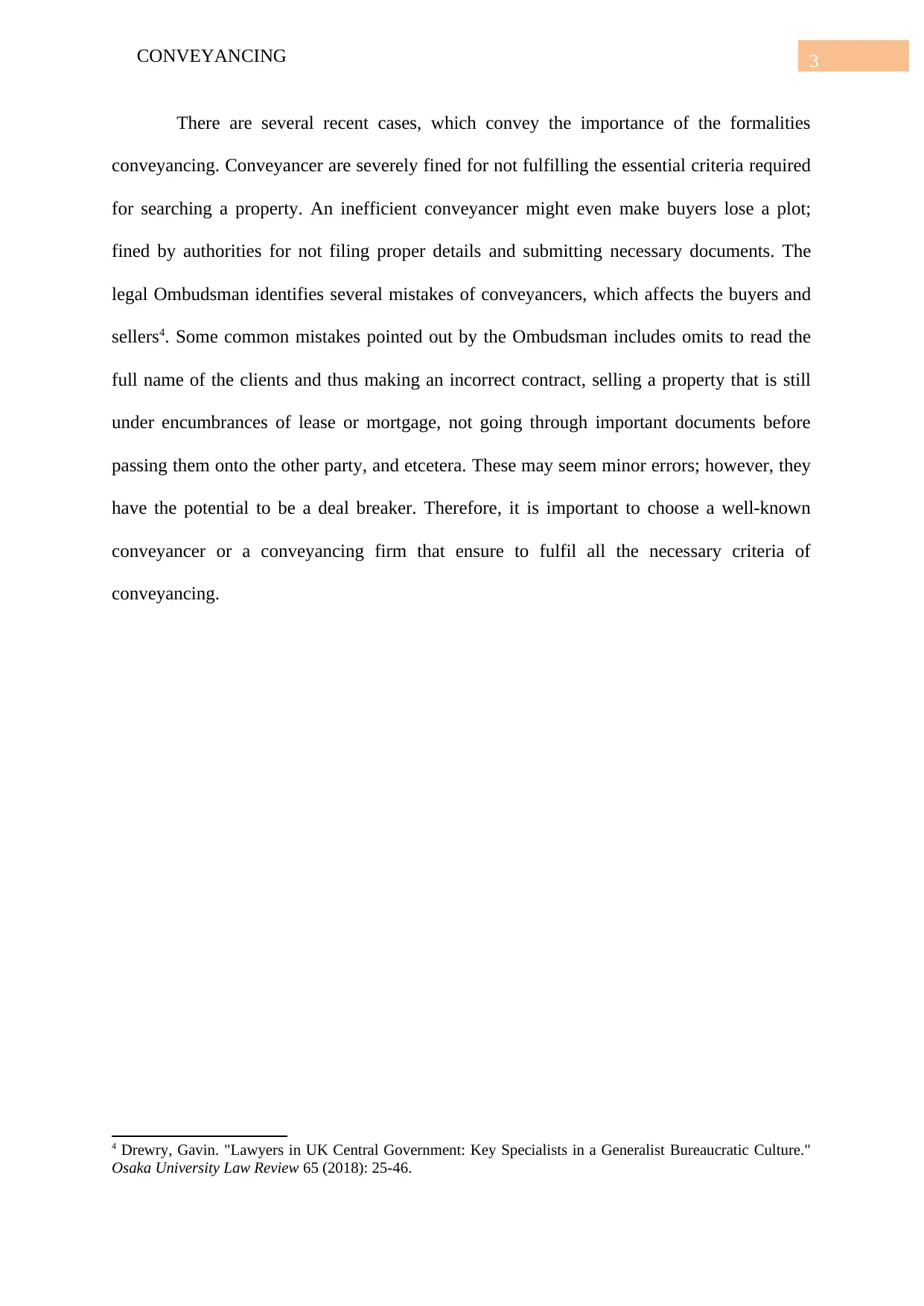
3CONVEYANCING
There are several recent cases, which convey the importance of the formalities
conveyancing. Conveyancer are severely fined for not fulfilling the essential criteria required
for searching a property. An inefficient conveyancer might even make buyers lose a plot;
fined by authorities for not filing proper details and submitting necessary documents. The
legal Ombudsman identifies several mistakes of conveyancers, which affects the buyers and
sellers4. Some common mistakes pointed out by the Ombudsman includes omits to read the
full name of the clients and thus making an incorrect contract, selling a property that is still
under encumbrances of lease or mortgage, not going through important documents before
passing them onto the other party, and etcetera. These may seem minor errors; however, they
have the potential to be a deal breaker. Therefore, it is important to choose a well-known
conveyancer or a conveyancing firm that ensure to fulfil all the necessary criteria of
conveyancing.
4 Drewry, Gavin. "Lawyers in UK Central Government: Key Specialists in a Generalist Bureaucratic Culture."
Osaka University Law Review 65 (2018): 25-46.
There are several recent cases, which convey the importance of the formalities
conveyancing. Conveyancer are severely fined for not fulfilling the essential criteria required
for searching a property. An inefficient conveyancer might even make buyers lose a plot;
fined by authorities for not filing proper details and submitting necessary documents. The
legal Ombudsman identifies several mistakes of conveyancers, which affects the buyers and
sellers4. Some common mistakes pointed out by the Ombudsman includes omits to read the
full name of the clients and thus making an incorrect contract, selling a property that is still
under encumbrances of lease or mortgage, not going through important documents before
passing them onto the other party, and etcetera. These may seem minor errors; however, they
have the potential to be a deal breaker. Therefore, it is important to choose a well-known
conveyancer or a conveyancing firm that ensure to fulfil all the necessary criteria of
conveyancing.
4 Drewry, Gavin. "Lawyers in UK Central Government: Key Specialists in a Generalist Bureaucratic Culture."
Osaka University Law Review 65 (2018): 25-46.
Paraphrase This Document
Need a fresh take? Get an instant paraphrase of this document with our AI Paraphraser
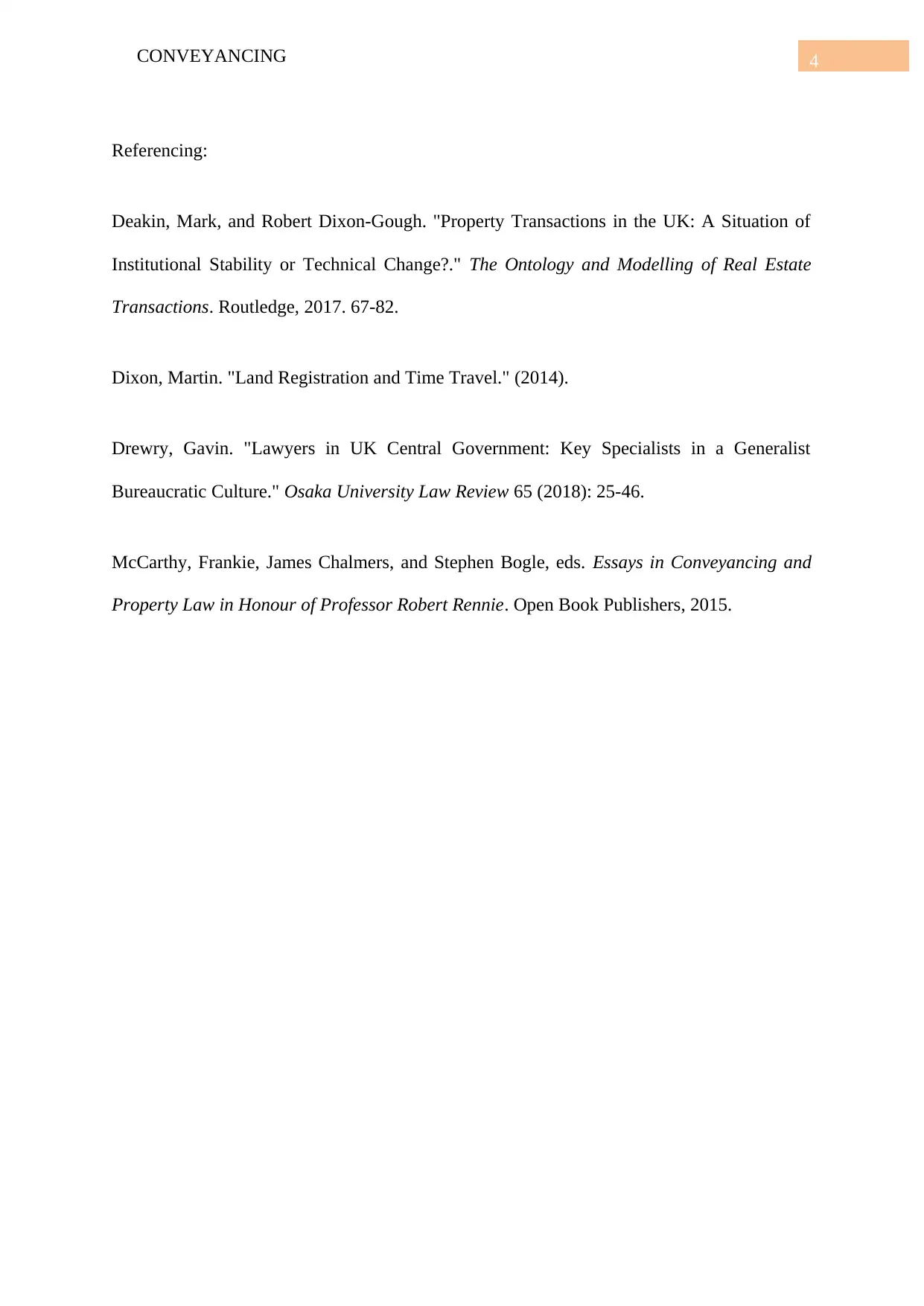
4CONVEYANCING
Referencing:
Deakin, Mark, and Robert Dixon-Gough. "Property Transactions in the UK: A Situation of
Institutional Stability or Technical Change?." The Ontology and Modelling of Real Estate
Transactions. Routledge, 2017. 67-82.
Dixon, Martin. "Land Registration and Time Travel." (2014).
Drewry, Gavin. "Lawyers in UK Central Government: Key Specialists in a Generalist
Bureaucratic Culture." Osaka University Law Review 65 (2018): 25-46.
McCarthy, Frankie, James Chalmers, and Stephen Bogle, eds. Essays in Conveyancing and
Property Law in Honour of Professor Robert Rennie. Open Book Publishers, 2015.
Referencing:
Deakin, Mark, and Robert Dixon-Gough. "Property Transactions in the UK: A Situation of
Institutional Stability or Technical Change?." The Ontology and Modelling of Real Estate
Transactions. Routledge, 2017. 67-82.
Dixon, Martin. "Land Registration and Time Travel." (2014).
Drewry, Gavin. "Lawyers in UK Central Government: Key Specialists in a Generalist
Bureaucratic Culture." Osaka University Law Review 65 (2018): 25-46.
McCarthy, Frankie, James Chalmers, and Stephen Bogle, eds. Essays in Conveyancing and
Property Law in Honour of Professor Robert Rennie. Open Book Publishers, 2015.
1 out of 5
Related Documents
Your All-in-One AI-Powered Toolkit for Academic Success.
+13062052269
info@desklib.com
Available 24*7 on WhatsApp / Email
![[object Object]](/_next/static/media/star-bottom.7253800d.svg)
Unlock your academic potential
Copyright © 2020–2026 A2Z Services. All Rights Reserved. Developed and managed by ZUCOL.





